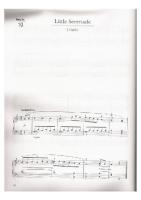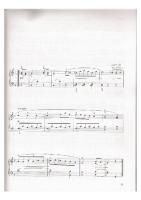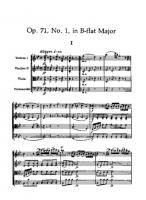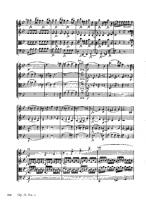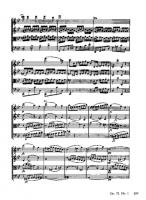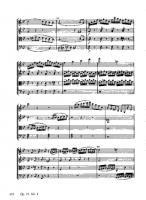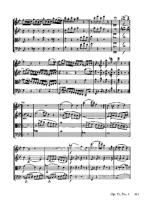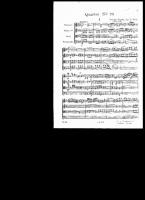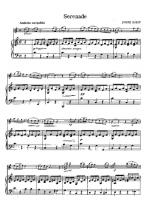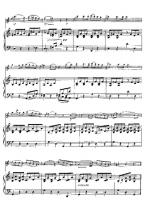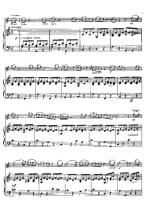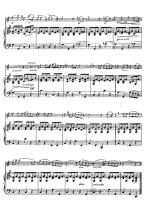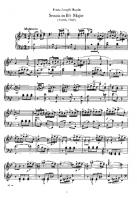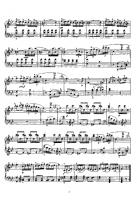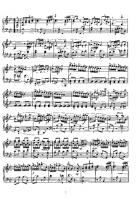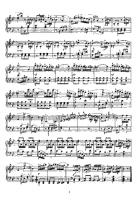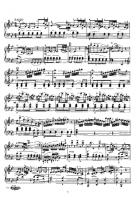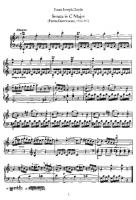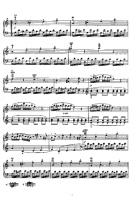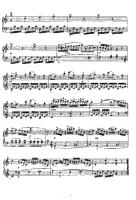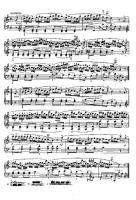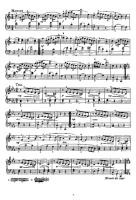Haydn Sheet Music
Franz Joseph Haydn (March 31, 1732 – May 31, 1809) was one of the most prominent composers of the classical period, and is called by some the "Father of the Symphony" and "Father of the String Quartet".
A life-long resident of Austria, Haydn spent most of his career as a court musician for the wealthy Hungarian Esterházy family on their remote estate. Isolated from other composers and trends in music until the later part of his long life, he was, as he put it, "forced to become original".
Although Haydn is still often called "Franz Joseph Haydn", the composer did not use the name "Franz" during his lifetime and this misnomer is avoided by modern scholars and historians. Joseph Haydn was the brother of Michael Haydn, himself a highly regarded composer, and Johann Evangelist Haydn, a tenor.
A central characteristic of Haydn's music is the development of larger structures out of very short, simple musical motifs, often derived from standard accompanying figures. The music is often quite formally concentrated, and the important musical events of a movement can unfold rather quickly.
Haydn's work was central to the development of what came to be called sonata form. His practice, however, differed in some ways from that of Mozart and Beethoven, his younger contemporaries who likewise excelled in this form of composition. Haydn was particularly fond of the so-called "monothematic exposition", in which the music that establishes the dominant key is similar or identical to the opening theme. Haydn also differs from Mozart and Beethoven in his recapitulation sections, where he often rearranges the order of themes compared to the exposition and uses extensive thematic development.
Perhaps more than any other composer's, Haydn's music is known for its humour. The most famous example is the sudden loud chord in the slow movement of his "Surprise" symphony; Haydn's many other musical jokes include numerous false endings (e.g., in the quartets Op. 33 No. 2 and Op. 50 No. 3), and the remarkable rhythmic illusion placed in the trio section of the third movement of Op. 50 No. 1.
A life-long resident of Austria, Haydn spent most of his career as a court musician for the wealthy Hungarian Esterházy family on their remote estate. Isolated from other composers and trends in music until the later part of his long life, he was, as he put it, "forced to become original".
Although Haydn is still often called "Franz Joseph Haydn", the composer did not use the name "Franz" during his lifetime and this misnomer is avoided by modern scholars and historians. Joseph Haydn was the brother of Michael Haydn, himself a highly regarded composer, and Johann Evangelist Haydn, a tenor.
A central characteristic of Haydn's music is the development of larger structures out of very short, simple musical motifs, often derived from standard accompanying figures. The music is often quite formally concentrated, and the important musical events of a movement can unfold rather quickly.
Haydn's work was central to the development of what came to be called sonata form. His practice, however, differed in some ways from that of Mozart and Beethoven, his younger contemporaries who likewise excelled in this form of composition. Haydn was particularly fond of the so-called "monothematic exposition", in which the music that establishes the dominant key is similar or identical to the opening theme. Haydn also differs from Mozart and Beethoven in his recapitulation sections, where he often rearranges the order of themes compared to the exposition and uses extensive thematic development.
Perhaps more than any other composer's, Haydn's music is known for its humour. The most famous example is the sudden loud chord in the slow movement of his "Surprise" symphony; Haydn's many other musical jokes include numerous false endings (e.g., in the quartets Op. 33 No. 2 and Op. 50 No. 3), and the remarkable rhythmic illusion placed in the trio section of the third movement of Op. 50 No. 1.
Haydn - op.42 String Quartet Cello Sheet Music
Advertisement
Advertisement
Please click on the button to get the sheet music
You can share this sheet on your Twitter or Facebook account to let your friends know too!
Comments about op.42 String Quartet by Haydn
There are no comments yet
Name (required)
Email (required, will not be published)
Email (required, will not be published)
Total 0/1000 chars
Other music sheets of Haydn
Search for Free Sheet Music
You can make a search through the entire collection of sheets.
You can make a search through the entire collection of sheets.
Latest Artists
Alicia Keys
× 2
The Crusaders × 1
Maria Grever × 1
Brahms × 6
Friedrich Wieck × 1
Michael Krug × 1
Genesis × 1
Doc Pomus × 1
Irene Cara × 1
Irving Berlin × 2
Wiliam Murphy × 1
Joe Zawinul × 1
Gloria Gaynor × 1
Nat King Cole × 1
Arlene Schwartzkopf × 1
Agustín Lara × 1
Paul Smadbeck × 1
Erroll Garner × 1
József Rieth × 1
The Secret Garden × 2
Avenue Q × 1
Charles-Valentin Alkan × 2
Bill Evans × 4
Otis Spann × 1
Regina Spekor × 1
Liana Alexandra × 1
Charles Strouse × 1
Ennio Morricone × 3
Raymond Pauls × 1
Stephen Schwartz × 1
Bedrich Smetana × 1
Nicollo Paganini × 1
Walt Harrah × 1
Traditional × 64
Albert Roussel × 1
Giuseppe Cappotto × 1
Saint Seiya × 1
Janis Joplin × 1
Javad Maroufi × 1
Pokémon Ruby × 1
Robert Burns × 1
Zoltan Paulinyi × 2
Nobuo Uematsu × 5
André-Bloch × 1
Ouran High School Host Club × 1
Luis R. Miranda × 1
Robbie Williams × 1
Enya × 1
Jamey Aebersold × 1
Brenda Lee × 1
The Crusaders × 1
Maria Grever × 1
Brahms × 6
Friedrich Wieck × 1
Michael Krug × 1
Genesis × 1
Doc Pomus × 1
Irene Cara × 1
Irving Berlin × 2
Wiliam Murphy × 1
Joe Zawinul × 1
Gloria Gaynor × 1
Nat King Cole × 1
Arlene Schwartzkopf × 1
Agustín Lara × 1
Paul Smadbeck × 1
Erroll Garner × 1
József Rieth × 1
The Secret Garden × 2
Avenue Q × 1
Charles-Valentin Alkan × 2
Bill Evans × 4
Otis Spann × 1
Regina Spekor × 1
Liana Alexandra × 1
Charles Strouse × 1
Ennio Morricone × 3
Raymond Pauls × 1
Stephen Schwartz × 1
Bedrich Smetana × 1
Nicollo Paganini × 1
Walt Harrah × 1
Traditional × 64
Albert Roussel × 1
Giuseppe Cappotto × 1
Saint Seiya × 1
Janis Joplin × 1
Javad Maroufi × 1
Pokémon Ruby × 1
Robert Burns × 1
Zoltan Paulinyi × 2
Nobuo Uematsu × 5
André-Bloch × 1
Ouran High School Host Club × 1
Luis R. Miranda × 1
Robbie Williams × 1
Enya × 1
Jamey Aebersold × 1
Brenda Lee × 1









